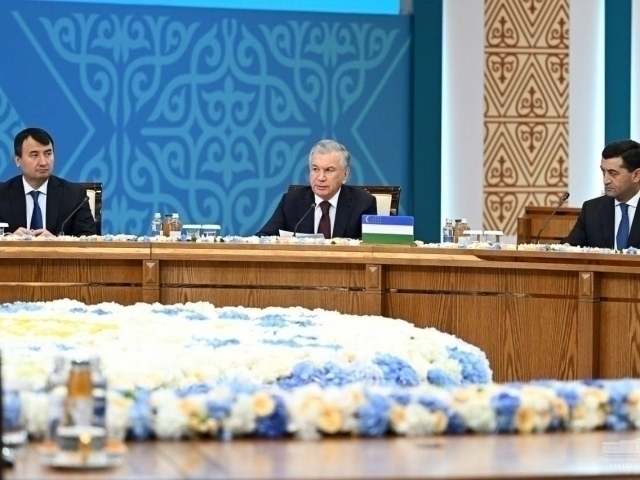Mirziyoyev participates in the second “Central Asia - Germany” summit
Local
−
17 September 2024 4575 6 minutes
President of the Republic of Uzbekistan Shavkat Mirziyoyev participated in the second "Central Asia - Germany" summit in Astana on September 17. This was reported by the President's press service.
German Chancellor Olaf Scholz, Kyrgyz President Sadir Japarov, Tajikistan President Emomali Rahmon, and Turkmenistan President Serdar Berdymukhamedov also took part in the event chaired by the President of the Republic of Kazakhstan, Kasim-Jomart Tokayev.
The summit discussed issues related to the further deepening of multilateral cooperation between the countries of Central Asia and Germany. Special attention was given to the development of partnerships in investment and technology, critical raw materials, green energy, transport and logistics, combating climate change, and the implementation of educational and cultural programs.
In his speech, the President of Uzbekistan highly appreciated Germany's firm and unwavering support for democratic changes and socio-economic reforms, as well as for regional cooperation and integration.
"Our first meeting in Berlin and today's summit once again confirm our common desire to continue our open and constructive dialogue aimed at achieving concrete, practical results," said Shavkat Mirziyoyev.
The head of state emphasized that relations with Germany have deep historical roots and highlighted the important role of the Federal Republic in achieving the goals of sustainable development in Central Asia. It was noted that the significant changes in the region in recent years serve to rapidly advance mutually beneficial cooperation.
The President of Uzbekistan proposed a number of new initiatives and proposals to further develop comprehensive cooperation between Central Asia and Germany.
First, the head of Uzbekistan highly valued the establishment of a strategic regional partnership between Central Asia and Germany and suggested adopting a concept for long-term cooperation development, which includes program activities in priority areas.
To develop this concept, it was emphasized that a forum of think tanks, "Central Asia - Germany," should be established, with its first meeting planned to be held in Khiva next year.
It was noted that the annual meetings of the heads of foreign policy agencies of our countries play a crucial role in preparing the summit agenda.
Strengthening investment and technological partnerships with leading German companies is a priority.
In this regard, it was proposed to develop a "roadmap" for expanding investment and technological cooperation between the countries of Central Asia and Germany. The active involvement of leading German companies and banks in joint projects in the region was also suggested. Furthermore, the possibility of establishing a Council of Investors and Entrepreneurs for "Central Asia and Germany" was proposed, along with adopting a multilateral intergovernmental agreement on the promotion and protection of investments.
Cooperation in the field of critical raw materials, utilizing advanced German knowledge and technologies, was identified as a promising direction.
"We are discussing projects related to geological exploration, rapid exploitation, processing, and the production of high-value-added products, as well as their delivery to Germany and other European Union countries," said Mirziyoyev.
It was noted that Uzbekistan is ready to participate in the joint implementation of such projects in neighboring countries.
Additionally, Uzbekistan is interested in obtaining technical support from Germany for the program to create digital maps of deposits of critical minerals and rare metals identified in the region. The importance of establishing a reliable legal framework for such cooperation was emphasized.
Cooperation in the field of green energy is particularly significant.
"In recent years, solar, wind, and hydropower projects have been actively developing in our countries. Thermal plants and networks are being modernized, and green hydrogen projects are being promoted," said the leader of Uzbekistan.
The head of state proposed establishing an energy dialogue between Central Asian countries and Germany, involving energy ministries, large corporations, operators, scientific organizations, and industry experts.
Interest was expressed in preparing a comprehensive program to enhance the capacity of specialists in the field of the low-carbon economy, with the technical support of Germany.
The joint effort to combat climate change has become particularly urgent.
In this regard, it was proposed to expand joint educational programs and scientific exchanges focused on the study of the environment and climate change, utilizing the University of Central Asia. This includes introducing German technologies for the rational use of water, modernizing irrigation systems, and adopting cooperation programs for the preservation of biological diversity and training environmental specialists.
Uzbekistan is ready to support the initiative of Central Asian nature cooperation proposed by the German Chancellor and to actively participate in its implementation.
"The underdevelopment of transport communications, including surface and air transportation, is the biggest obstacle to deepening our partnership," said Shavkat Mirziyoyev.
In this context, President Mirziyoyev called on the German side to assist in attracting European institutions to the development of alternative transport corridors connecting Central Asia with Europe.
Mirziyoyev proposed holding a ministerial conference in 2025 to explore ways to enhance the transit potential of these routes.
The President of Uzbekistan emphasized the importance of developing cultural and humanitarian cooperation and proposed adopting a plan for joint cultural events, including Central Asian art and cinema days in major German cities and establishing mutual cooperation between museums.
The necessity of launching a cooperation platform involving leading higher education institutions for scientific and educational exchange was highlighted. This includes developing programs for expanding dual education with the Goethe Institute and other German organizations and training German language teachers.
The need for continued close cooperation with Germany in combating terrorism, extremism, and cybercrime, as well as preventing youth radicalization, was also noted.
The head of Uzbekistan pointed out that the security situation in Central Asia is closely linked to the developments in Afghanistan.
"We believe it is crucial to prevent the humanitarian crisis in Afghanistan from worsening, as the country is facing numerous challenges on its own," said Shavkat Mirziyoyev.
For this reason, Uzbekistan, together with Germany and other European countries, is committed to involving Afghanistan in regional economic cooperation and training personnel, including women, in fields necessary for Afghanistan's peaceful development, through the Education Center in the bordering city of Termiz. We expressed readiness to implement joint projects.
The leaders of the Central Asian countries and the Chancellor of Germany also spoke at the summit. At the conclusion of the event, a Joint Statement was adopted.





